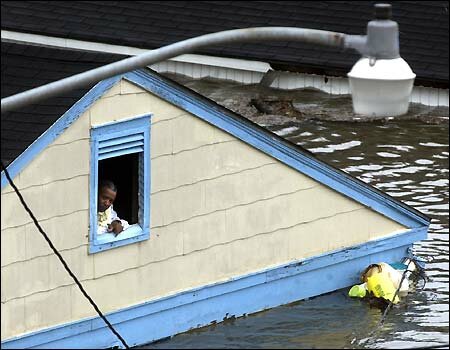"The river rose all day,
The river rose all night.
Some people got lost in the flood,
Some people got away all right.
The river have busted through clear down to Plaquemine:
Six feet of water in the streets of Evangeline."
Louisiana, Louisiana,
They're trying to wash us away,
They're trying to wash us away…."
—Randy Newman, Louisiana 1927

Most of the victims, as anyone with half a brain could have expected, are African Americans, disproportionally trapped in the claws of poverty. This simple fact apparently eluded or was of no compelling interest to the entire political establishment, from Bush on down to the local professionals. Race and class have seldom marched so tightly in step to aggravate a catastrophe. Copyleft CJO 2005
The destruction of New Orleans represents a confluence of many of the most pernicious trends in American politics and culture: poverty, racism, militarism, elitist greed, environmental abuse, public corruption and the decay of democracy at every level.
Much of this is embodied in the odd phrasing that even the most circumspect mainstream media sources have been using to describe the hardest-hit victims of the storm and its devastating aftermath: "those who chose to stay behind." Instantly, the situation has been framed with language to flatter the prejudices of the comfortable and deny the reality of the most vulnerable.
It is obvious that the vast majority of those who failed to evacuate are poor: they had nowhere else to go, no way to get there, no means to sustain themselves and their families on strange ground. While there were certainly people who stayed behind by choice, most stayed behind because they had no choice. They were trapped by their poverty - and many have paid the price with their lives.
Yet across the media spectrum, the faint hint of disapproval drips from the affluent observers, the clear implication that the victims were just too lazy and shiftless to get out of harm's way. There is simply no understanding - not even an attempt at understanding - the destitution, the isolation, the immobility of the poor and the sick and the broken among us.
This is from the "respectable" media; the great right-wing echo chamber was even less restrained, of course, leaping straight into giddy convulsions of racism at the first reports of looting in the devastated city. In the pinched-gonad squeals of Rush Limbaugh and his fellow hatemongers, the hard-right media immediately conjured up images of wild-eyed darkies rampaging through the streets in an orgy of violence and thievery.
Not that the mainstreamers ignored the racist angle. There was the already infamous juxtaposition of captions for wire service photos, where depictions of essentially the same scene - desperate people wading through flood waters, clutching plastic bags full of groceries - were given markedly different spins. In one picture, a white couple are described as struggling along after finding bread and soda at a grocery store. But beneath an almost identical photo of a young black man with a bag of groceries, we are told that a "looter" wades through the streets after robbing a grocery store. In the photo I saw, this evil miscreant also had a - gasp! - pack of diapers under his arm.
Almost all of the early "looting" was like this: desperate people - of all colors - stranded by the floodwaters broke into abandoned stores and carried off food, clean water, medicine, clothes. Perhaps they should have left a check on the counter, but then again - what exactly was going to happen to all those perishables and consumer goods, sitting around in fetid, diseased water for weeks on end? (The mayor now says it could be up to 16 weeks before people can return to their homes and businesses.) Obviously, most if not all of it would have been thrown away or written off in any case. Later, of course, there was more organized looting by criminal gangs, the type of lawless element - of every hue, in every society - whose chief victims are, of course, the poor and vulnerable. These criminal operations were quickly conflated with the earlier pilferage to paint a single seamless picture of the American media's favorite horror story: Black Folk Gone Wild.
But here again another question was left unasked: Where were the resources - the money, manpower, materiel, transport - that could have removed all those forced to stay behind, and given them someplace safe and sustaining to take shelter? Where, indeed, were the resources that could have bolstered the city's defenses and shored up its levees? Where were the National Guard troops that could have secured the streets and directed survivors to food and aid? Where were the public resources - the physical manifestation of the citizenry's commitment to the common good - that could have greatly mitigated the brutal effects of this natural disaster?
Chris Floyd is an American journalist. He writes the weekly Global Eye political column for The Moscow Times and St. Petersburg Times. His work also appears in The Ecologist, The Nation, CounterPunch, Christian Science Monitor, Bergen Record, Columbia Journalism Review and elsewhere around the world. He is the author of the book, Empire Burlesque: The Secret History of the Bush Regime. His main blog is located at http://www.chris-floyd.com/
|

